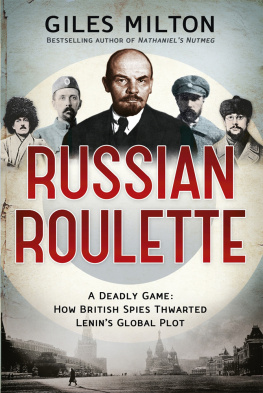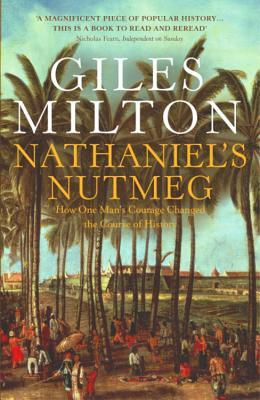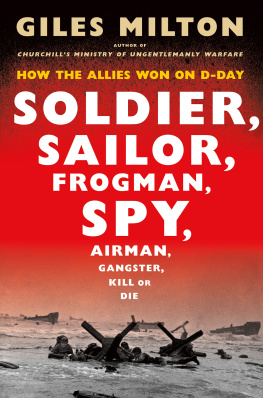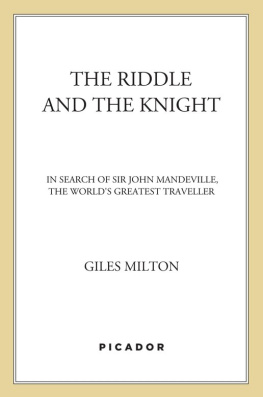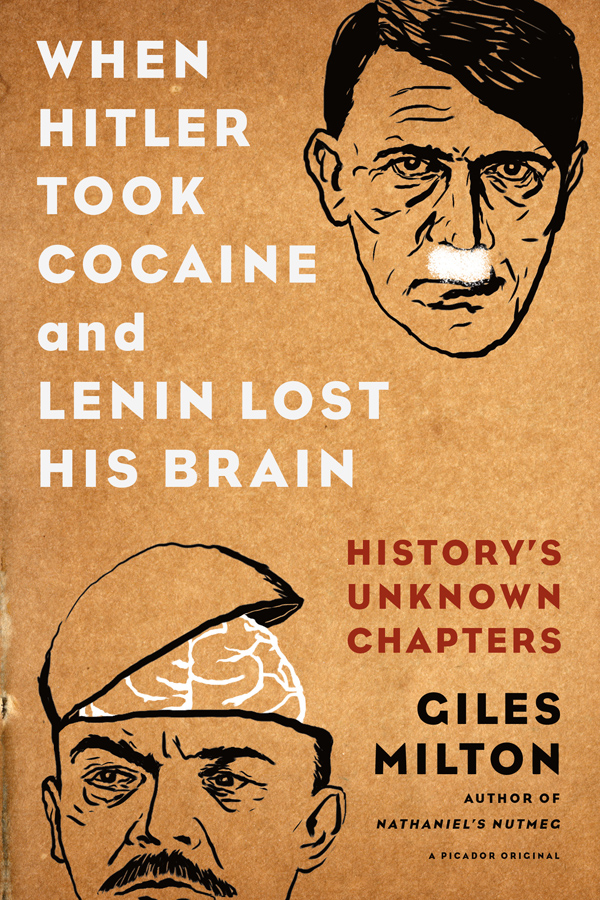Contents
Guide
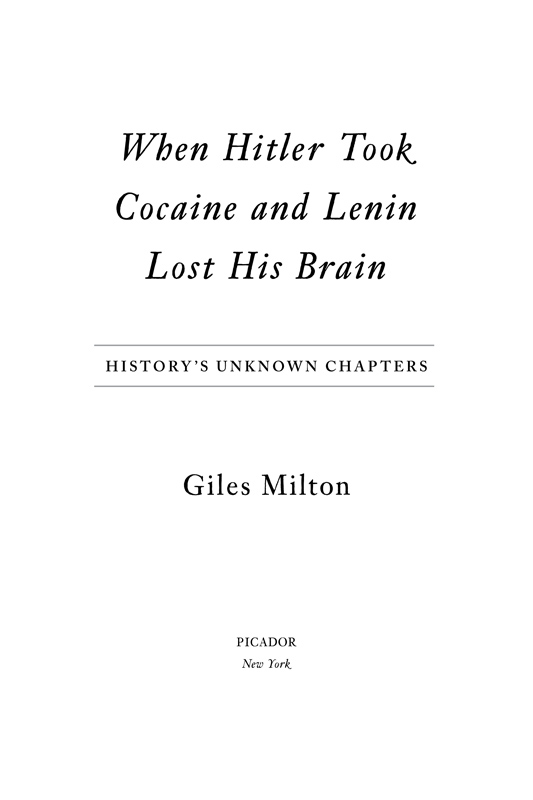
The author and publisher have provided this e-book to you for your personal use only. You may not make this e-book publicly available in any way. Copyright infringement is against the law. If you believe the copy of this e-book you are reading infringes on the authors copyright, please notify the publisher at: us.macmillanusa.com/piracy.
In the summer of 2012, a cache of extraordinary medical documents came to light in America. They included the records of Dr Theodor Morell, personal physician to Adolf Hitler, and notes written by four other doctors who treated the Fhrer.
At first glance, the documents seemed little more than an historical footnote, one to be added to the mass of existing material about Hitler. But footnotes can often conceal nuggets of gold, and this one opened a wholly unknown chapter of history. The cache revealed that the Fhrer was being prescribed a heady cocktail of drugs, including cocaine, amphetamines and testosterone. Indeed he was taking up to 80 drugs a day, at the same time as masterminding his attempted conquest of the world.
Much of my working life is spent in the archives, delving through letters and personal papers like those written by Dr Morell. The huge collection housed in Britains National Archives is incompletely catalogued (the National Archives in Washington DC is somewhat better) and you can never be entirely sure what you will find in any given box of documents. Days can pass without unearthing anything of interest: I liken it to those metal-detecting treasure-hunters of North Carolina, who scour the Outer Banks in the hope of turning up a Jacobean shilling or signet ring.
Persistence often pays rich dividends, and this bookan idiosyncratic collection of unknown historical chaptersis the result of my own metaphorical metal detecting. Amidst the flotsam and jetsam, Ive found (I hope) some glittering gems. Theres the lone Japanese soldier still fighting the Second World War in 1974; the British agent-cum-hitman who assassinated Rasputin (as with Dr Morell, this story has only recently come to light); and the tale of the shipwrecked Dutch mariners who ate the last dodo.
Some of the stories are truly eye-stretching. The testimony of Sun Yaoting, the last eunuch of China, is not only painful but extraordinarily poignant. It sheds light on the twilight years of imperial China, when centuries of tradition were swept away in the blink of an eye. Sun Yaoting, alas, was to find himself on the wrong side of history.
Ive long believed that historical detail is vitally important when attempting to reconstruct the past. Detail can illuminate events in a way that the broad brushstroke cannot. The obsessive quest on the part of Soviet scientists to find the genius inside Lenins brain is a case in point. It reveals much about neurological science of the 1920sthen in its infancyand even more about the Soviet Unions cult of personality, of which this was one of the earliest manifestations.
Many of the stories in this collection are about individuals, often unremarkable individuals, who found themselves caught up in truly extraordinary situations. Some were swept through defining moments of history: Tsutomu Yamaguchi, who survived the atomic bombs at both Hiroshima and Nagasaki, is one of them. Others were unwilling partakers in catastrophe: men like Charles Joughin, who not only survived the Titanic disaster, but did so with an amazing story to tell.
Just occasionally, the stories reveal something about ourselves. Ive often found myself musing on what I would have done if Id found myself in situations similar to the men and women in this collection. Would I have been as cool under pressure as Walter Harris, the Moroccan correspondent for The Times, when captured by murderous Islamic extremists in 1903? I doubt it.
These days, were unlikely to be exhibited as a human freak, as was Ota Benga, and equally unlikely to be buried alive, as was Augustine Courtauld. But anything can happen to anyone: who knows, you may yet get caught in an adventure that will one day be recognised as a highly prized nugget of history.
Giles Milton, London
January 2016
Contents
Gring has only got one ball,
Hitlers are so very small,
Himmlers so very similar,
And Goebbels has no balls at all.
THE ORIGINAL WORDS TO HITLER HAS ONLY GOT ONE BALL , CIRCA AUGUST 1939. ATTRIBUTED TO TOBY OBRIEN, PUBLICIST FOR THE BRITISH COUNCIL.
Unity Mitford was a plain-looking woman with bad teeth and a plump belly. But she had never been troubled by her strange looks and knew that she was more likely to catch the man of her dreams by speaking her mind rather than flaunting her body.
In the summer of 1934, she travelled to Munich in the hope of meeting her idol, Adolf Hitler. Although he was Fhrer of Germany, it was relatively easy to see him in public since he was accustomed to eating at the same cafes and restaurants each day.
When Unity learned that he often had lunch at the Osteria Bavaria, she began eating there as well. She did everything she could to catch his attention. Yet ten months were to pass before Hitler finally invited the persistent English girl to his table. The two of them chatted for half an hour and quickly realized they were soulmates.
It was the most wonderful and beautiful [day] of my life, wrote Unity to her father. I am so happy that I wouldnt mind a bit, dying. Id suppose I am the luckiest girl in the world. For me he is the greatest man of all time.
Her feelings were reciprocated. Hitler was particularly intrigued by Unitys middle name, Valkyrie. And he was fascinated to learn that her grandfather had translated the anti-Semitic works of Houston Stewart Chamberlain, one of his favourite authors.
Hitler began to see more and more of his fair-haired English companion, much to the annoyance of his official girlfriend, Eva Braun. She is known as the Valkyrie and looks the part, including her legs, wrote Braun scornfully in her diary. I, the mistress of the greatest man in Germany and the whole world, I sit here waiting while the sun mocks me through the window panes.
Unity was now introduced to members of Hitlers inner circle. She got along particularly well with the thuggish Julius Streicher, publisher of the vitriolic anti-Semitic newspaper Der Strmer .
When Unity delivered a particularly racist diatribe against the Jews, Streicher asked if he could print it in his paper. Unity was flattered. The English have no notion of the Jewish danger, began her article. Our worst Jews work only behind the scenes. We think with joy of the day when we will be able to say England for the English! Out with the Jews! Heil Hitler! She ended her text with the words: Please publish my name in full, I want everyone to know I am a Jew hater.
Hitler was so pleased with what Unity had written that he awarded her a golden swastika badge as well as a private box at the 1936 Berlin Olympics.
She now became one of the Fhrers intimates, visiting him on numerous occasions and constantly expressing her admiration for him. He was no less smitten with her: in 1938, he even offered her an apartment in Munich. Unity had high hopes of replacing Eva Braun in his affections.
By now, her behaviour had aroused the suspicions of the British Secret Service. The head of MI5, Guy Liddell, was particularly alarmed by her closeness to Hitler. He felt that her friendship with him warranted her being put on trial for high treason.


